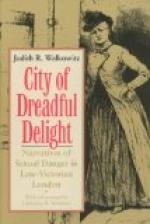The hut of the fagot-maker was the four walls and a roof and the earth that floored it, but it was wealth because it was shelter. It had two doors which were merely openings in the sides and between them lay the man on sheep-pelts with a cotton abas, which one of the Galileans had left, over him. At one of these doors, sitting sidewise, so that he could watch in or out, sat Joseph.
All night the man on the sheepskins spoke to the blackened thatch above him of the siege of Jerusalem and the treachery of Julian of Ephesus. He read letters from Costobarus and instructed Aquila over and over again. Then he tossed a coin and spent hours counting the hairs in the long locks that fell from the shining head of the moon down upon his breast, at midnight.
At times the boy, with the exquisite beauty of sleep on his heavy lids, would creep over from his vigil at the door and lay his cool hand on the sick man’s forehead. And the sick man would speak in a low controlled voice, saying:
“Naaman being a leper, my friend, why was not the law fulfilled against him?”
But the soothing influence of that touch did not endure. Again, he took census of the fighting-men of Judea, by the Roman statistics which he had from the decurion, and searched through his tunic for his wallet to write down the result. Failing to find it, he raised himself to shout for Julian to return his property.
Again the cool hands would stroke the fevered forehead and the sick man would say:
“Good my Lord, they fetched snow from the mountains to cool this wine.”
But how white the hands of that fair girl in the hills! Why, these hands beside hers were as satyrs’ hooves to anemones! Her lashes were so long, and he knew that her lips were as cool as the heart of a melon; but that husband of hers knew better than he!
And he, grandson of the just Maccabee, allied by marriage to the noble line of Costobarus through his daughter, Laodice, the bride with the greatest dowry in Judea, had staked his soul on the toss of a coin and had lost it!
At this the shepherd boy straightened himself and gave attention.
But he was wholly lost, the sick man would go on, rolling his head from side to side; he could not join Laodice because he had loved a woman of the wayside and could not cast out that love; he was not a Jew because he had rather linger with this strange beauty in the hills than hasten on the rescue of Jerusalem; he had not apostatized, though he was as wholly lost as if he had done so; he hated the heathen and would not be one of them. He would abide in the wilderness and perish, if this young spirit that abode by his side, with a face like Michael’s and a form so like the shepherd David’s, would only suffer the darkness to come at him.




